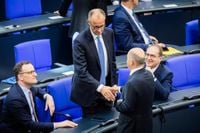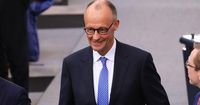On May 6, 2025, Friedrich Merz was elected as Germany's new Chancellor after a dramatic vote in the Bundestag, the German Federal Parliament. Merz, the leader of the Christian Democratic Union (CDU), faced an unexpected setback in the first round of voting, where he failed to secure enough support. However, he rallied in the second round, ultimately receiving 325 votes, exceeding the required majority of 316.
The political landscape leading up to Merz's election was tumultuous. His coalition, which includes the CDU and the Social Democratic Party (SPD), holds a combined total of 328 seats in the Bundestag, a coalition that has not been seen in Germany since the end of World War II. This new alliance was formed after the CDU garnered only 28.5% of the votes in the February elections, necessitating a partnership with the SPD, which achieved a mere 16.4%—its worst result in post-war history.
Merz's victory comes at a time of significant political tension, both domestically and internationally. His initial failure to secure enough votes in the first round was seen as a major embarrassment for the newly formed coalition, raising concerns about the stability of the government. Yet, Merz managed to secure the necessary votes in the second round, marking a pivotal moment in German politics.
In his acceptance speech, Merz emphasized the need for economic revival, promising to implement policies aimed at reducing corporate taxes and energy prices. He also committed to supporting Ukraine and increasing military spending, reflecting a clear stance on Germany's role in global affairs. His coalition agreement outlines ambitious plans to stimulate growth, which many hope will address the pressing economic challenges facing the nation.
Merz, who at 69 is the oldest Chancellor since Konrad Adenauer, is known for his assertive political style and strong presence. Having previously stepped away from politics for 12 years, he returned to the Bundestag in 2021 following the departure of former Chancellor Angela Merkel. His experience in both law and business, including significant roles in major companies, has shaped his approach to governance.
Despite his background, Merz's political journey has not been without controversy. He has faced criticism for his previous attempts to tighten immigration rules and for seeking support from the far-right Alternative for Germany (AfD) party. This move, while aimed at curbing the AfD's electoral success, sparked significant backlash and protests, highlighting the delicate balance he must maintain within the coalition and the broader German electorate.
As he embarks on this new chapter, Merz is also tasked with navigating Germany's complex relationship with the United States. His efforts to strengthen German-American ties through the "Atlantic Bridge" initiative are seen as essential, especially in light of the challenges posed by Donald Trump's presidency. Merz has expressed concerns about the shifting dynamics of U.S. foreign policy, particularly regarding its stance on Ukraine and Europe.
In a recent interview, Merz stated, "Supporting Kyiv remains a priority, and any reduction in that support could lead to a chaotic and dangerous situation." He believes that Europe must invest more in defense and security to play a more significant role on the global stage, a sentiment that resonates with Trump’s calls for European nations to take greater responsibility.
However, Merz's ambitious plans face significant hurdles. Domestically, Germany grapples with a lack of investment in infrastructure and education, alongside rising energy prices that threaten industrial competitiveness. The public's fatigue over ongoing support for Ukraine also complicates his efforts to unify the country behind his policies.
As Merz prepares to take office, he will need to address these internal challenges while also positioning Germany as a leader in Europe. His coalition government, which includes ten men and eight women, reflects a commitment to diversity and inclusivity in governance. The new administration is expected to prioritize urgent reforms in various sectors, including education, healthcare, and climate protection.
Merz's first full day in office will involve a visit to France and Poland, underscoring the importance of maintaining strong relationships with Germany's key allies. This diplomatic approach is critical as he seeks to reinforce Germany's role in Europe and its commitment to transatlantic cooperation.
Looking ahead, Merz's tenure will be closely watched, with many questioning whether he can successfully navigate the complexities of contemporary German politics. The rise of the far-right and the challenges posed by global economic uncertainties will test his leadership and the resilience of his coalition.
Ultimately, Friedrich Merz's ascension to the Chancellorship marks a significant shift in German politics, as he aims to lead the country through a critical period of transformation. His ability to balance domestic priorities with international obligations will define his legacy and the future trajectory of Germany on the world stage.





